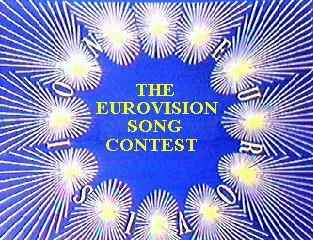 The Eurovision starburst card (left) was used for over 30 years to mark all Eurovision programme exchanges, but it is best remembered for it's use in the Eurovision Song Contest
The Eurovision starburst card (left) was used for over 30 years to mark all Eurovision programme exchanges, but it is best remembered for it's use in the Eurovision Song ContestThe French Minister of Culture called it 'A monument to drivel', but the former Norwegian Minister of Culture Åse Kleveland sang in it, and has also been a presenter! What are we talking about?
 The Eurovision starburst card (left) was used for over 30 years to mark all Eurovision programme exchanges, but it is best remembered for it's use in the Eurovision Song Contest
The Eurovision starburst card (left) was used for over 30 years to mark all Eurovision programme exchanges, but it is best remembered for it's use in the Eurovision Song Contest
For those of you who don't know, the Eurovision Song Contest is an annual contest organised by the state run TV stations of European nations to find the best new popular song.
It all began in 1956. Europe was pulling itself from the ashes of World War II, and Television services were opening all over Europe. It was realised that by pooling resources, programmes could be made for sharing over the whole of Europe, this reducing costs.
Technical issues were formidable. There were no satellites, videotape was in its infancy, but landlines were laid to join all the nations of the European Broadcasting Union. The system was called Eurovision. They had joint productions of plays, documentaries, and sports programmes, and devised a programme where countries got together to select the best new popular song. This was the Eurovision Song Contest. The first was held in Switzerland in 1956.
Now 41 years later, Eurovision continues to supply sport and news to the whole of Europe, and beyond, now by satellite, but the only programme still identified with Eurovision is the song contest.
Every member country of the European Broadcasting Union has the right to enter a song. How that song is selected is up to them. Many countries have their own selection programme, where, perhaps telephone votes from the public, select a singer and a new song to go to the next contest.
The main contest's songs are judged by panels of 16 in each country who give votes for their favourite songs. They are not allowed to vote for their own country.
There is a belief that only 'nobody' acts go into the contest, but this is untrue. Cliff Richard, Lulu & Sonia were all well known acts when they represented Britain. The same is true for other country's artists.